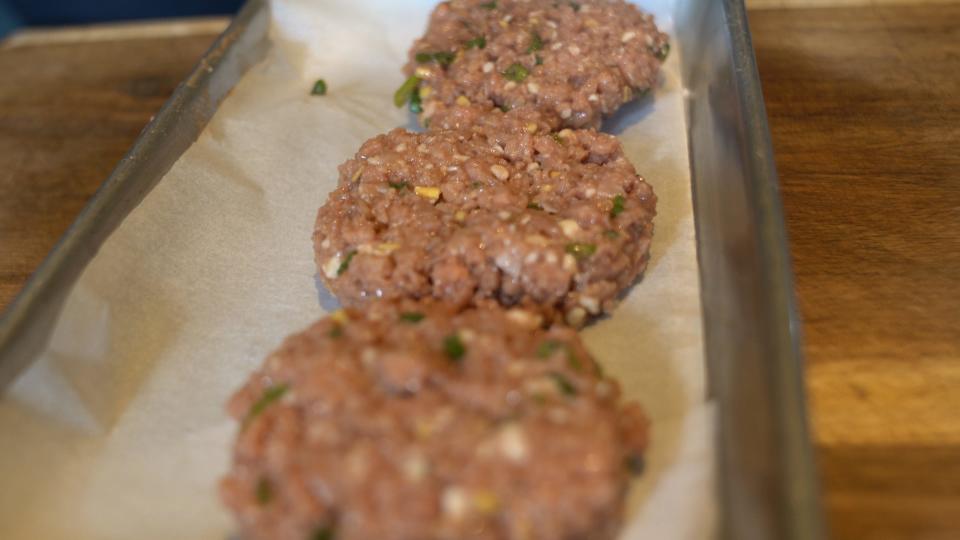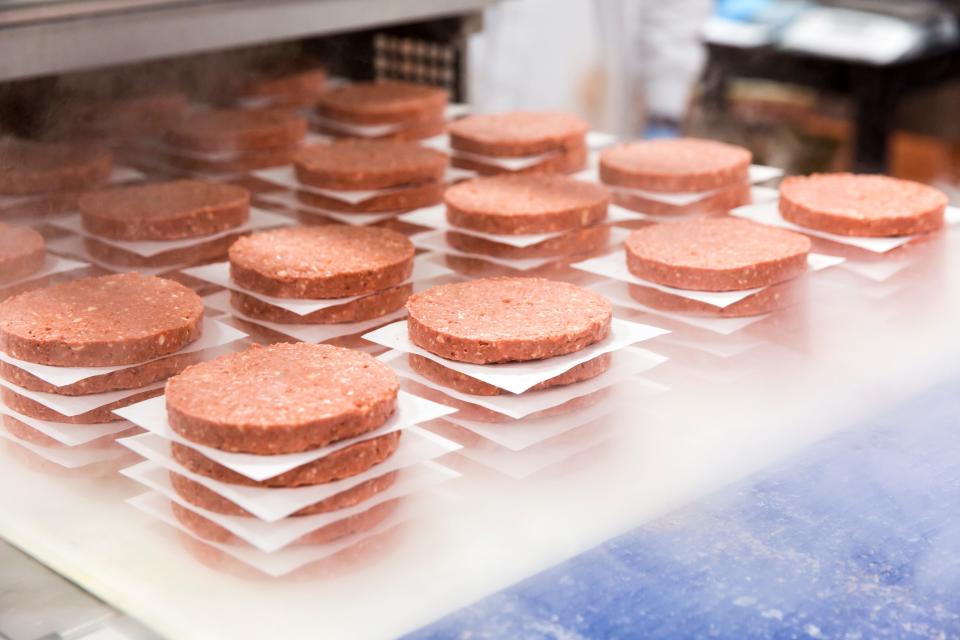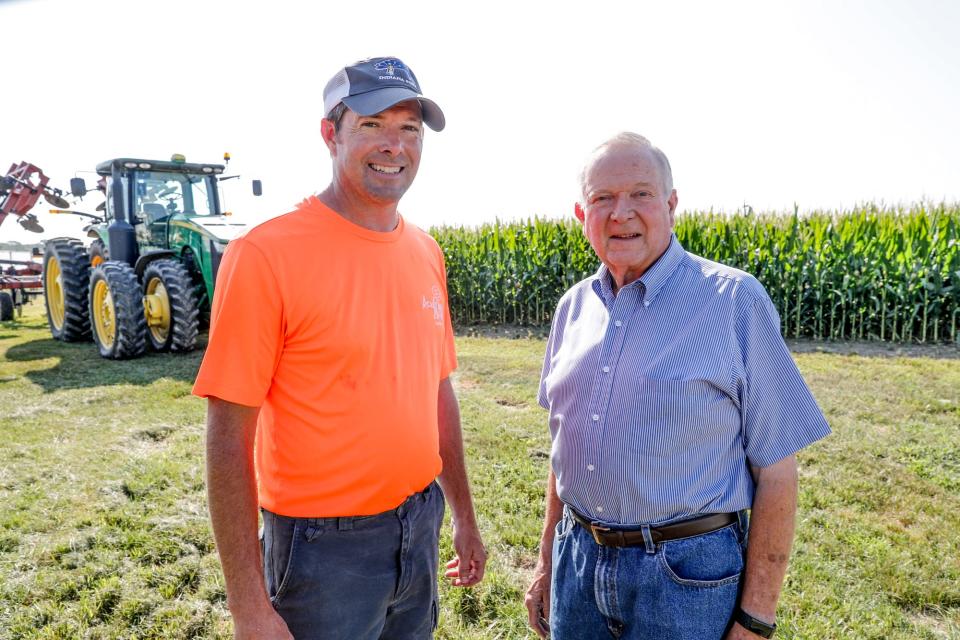The latest Impossible 'meat' has pork farmers questioning the name
A few months ago John Hardin stopped by a Burger King to try the Impossible Whopper for the first time. The plant-based burger patty on the Whopper sandwich had been lab engineered to mimic the taste and appearance of beef, and its soaring popularity last year created a national shortage.
"I wanted to taste it for myself," the Danville, Indiana, resident said. "I wanted to see how close it was."
Hardin had another reason for wanting to try the Impossible Burger: He wanted to understand what he saw as his future competition.
"This is going to have an impact on what I do, and I realized it was only one data point," said the 75-year-old patriarch of a family of Hoosier pork producers. "This is the very, very early days in how this will evolve."
About a year after Redwood, California-based Impossible Foods rolled out the Impossible Burger 2.0 in January 2019, the company introduced its newest plant-based product, Impossible Pork, at the international Consumer Electronics Show in Las Vegas.
Like its predecessor, Impossible Pork is engineered to replicate meat, and has some Indiana farmers bracing for what could possibly be a disruption to their business. The National Pork Producers Council, meanwhile, is objecting to the company's use of "pork" — a word that means flesh of a pig used for food — to describe a product derived from plants.
The food fight has begun.

Is pork still pork if it's not from a pig?
Your tenderloin or pork chop may well have come from an Indiana farm.
With roughly 2,800 farms raising hogs, Indiana is the fifth largest exporter of pork in the U.S. About 66% of Hoosier production takes place on farms that have more than 5,000 heads of hogs, said Josh Trenary, executive director of the Indiana Pork Producers Association.
Those hogs can end up at processing plants in Kentucky, Michigan and elsewhere, where they are made into chops, ham and bacon later stacked on grocery store shelves.
Impossible Foods aims to disrupt that process. The company's mission minces no words: eliminate the use of animals as a food source by 2035. In the place of animals, the company wants to see meat derived from alternative sources such as plants via processes that have less of an environmental impact.
Rachel Konrad, Impossible Foods spokeswoman, said the company is a long way from reaching that goal. To do that, the startup would have to double its growth, revenue and "everything else" every year for at least the next 15 years — an ambitious feat, Konrad admits.

For now, Impossible Foods just wants to get its plant-based, gluten-free meat in front of omnivores.
The company says its scientists have created what it views as a more sustainable, affordable way to make "meat" to feed a growing population.
Similar to the Impossible Burger, the company's plant-based pork contains soy leghemoglobin, a heme protein produced when scientists genetically engineer and ferment yeast. Heme is found in living plants and animals, and Impossible Foods says its version of heme is similar to what carnivores consume in meat. The molecule gives cooked meat its flavors and aromas, the company says.
Pork producers and the national council that represents them say they aren't afraid of competition, but they object to the usage of a specific term associated with animals being used to describe plant-based substitutes.
There's no pork in Impossible Pork, they say.
"They're taking our name," said Dan Kovich, director of science and technology for the National Pork Producers Council. "You can't make pork from plants unless you feed it to a pig."
Kovich and Hardin, the Indiana pork farmer, said consumers will decide whether Impossible Pork is a menu option they want to eat, but they are concerned about consumer confusion.
"I don't want them to think they're eating pork," said Hardin, whose farm operation has 500 mother pigs. "They're eating something that's meant to look like it."
He also questions whether its nutritional value is the same or less than lean meats. According to Impossible Foods, Impossible Pork has 16 grams of protein, 3 milligrams of iron, 13 grams of total fat and 7 grams of saturated fat in a 4 ounce serving.
Similarly, every 4 ounce Impossible Burger has 370 milligrams of sodium, 14 grams of fat, 19 grams of protein and 9 grams of carbs. Chipotle Mexican Grill and Whole Foods executives have criticized plant-based products from Impossible Foods and rival Beyond Meat as being too processed.
Pork producers aren't the only industry to challenge how companies label the packaging of imitations products. Cattle and dairy farmers have sought to codify, via federal regulations, what can be called "beef" and "milk."

Lawmakers across the country have moved to enact such labeling laws in their states. Missouri was the first to do so. The state's law requires that only products from slaughtered animals can be labeled as meat.
In Indiana, State Rep. Terry Goodin, D-Indianapolis, introduced House Bill 1350 at the General Assembly this session, but the bill is no longer being considered.
A Republican-backed bill moving through the Maryland General Assembly also died in a committee this year. The American Civil Liberties Union, Washington, D.C.-based nonprofit the Good Food Institute and the Animal Legal Defense Fund challenged the constitutionality of an Arkansas law to keep words like "burger" off the packaging o vegan and vegetarian food products. A federal court blocked that law in December.
During the same month, the Plant Based Foods Association, a trade organization, released a set of voluntary labeling standards for plant-based meat alternatives. Under the standards, packaging could have references to animal meat as well as qualifiers that indicate the product is not derived from an animal.
Trenary said the Indiana Pork has not taken a position publicly. He said the issue is better addressed by the federal government since the product is federally regulated.
"The fact that states are weighing in certainly demonstrates that there's concern out there overall," he said. "Indiana Pork is certainly supportive of the efforts nationally to make sure the naming conventions that are being used are clear."
Konrad of Impossible Foods downplays the potential for consumer confusion.
"We bend over backwards to emphasize that our product is made from plants," she said, adding that Impossible Burger labels state the product is plant-based. "In fact, the reason that our product is enjoying skyrocketing growth is precisely because there are no animals in it."
A growing market
Vegans and vegetarians are not the consumers Impossible Foods aims to attract.
"They're already doing the right thing for the environment because they're not eating,— you know, quite literally — high on the hog," Konrad said. "They are eating in a way that is sustainable and scalable for the planet. So we don't want them to eat our product at all. Save our product for the true carnivores."
The target market, she said, is the same market the pork industry seeks.
"Our goal is to take an increasing percentage of their customers and get the meat out of their diet and make it Impossible," she said.
There is a market for both plant-based and pig-based pork, Konrad said, adding that 95% of Impossible Foods consumers regularly eat animals.
Impossible Foods is expected to make Impossible Pork, which can be charbroiled, sauteed, baked and grilled, available to consumers later this year. The company also unveiled Impossible Sausage at CES, a version of the pork with a bit of spice. That product has debuted exclusively at Burger King.
Besides Impossible Foods, companies such as Tyson, Perdue Farms, Beyond Meat and Daily Harvest also are vying to fill consumers growing appetite for meat alternatives.
Grocery sales of plant-based foods that directly replace animal products have grown to $5 billion in 2019, a 29% increase over the prior two years, said The Good Foods Institute, citing SPINS retail data released March 3. Plant-based milk accounted for about $2 billion of those sales. Plant-based meat generated about $939 million in sales.
Brian Martin is a fifth generation farmer in western Indiana. He raises hogs for consumption and medical uses like in hernia bandages.
The rising popularity of meat alternatives hasn't affected his day-to-day operations, but a growing public interest in animal welfare and the environment has led to changes in how some pork producers raise their livestock, he said.
"A lot of our culture today is becoming more and more interested in where food comes from and its carbon footprint on our planet, and I think that's an awesome thing," Martin said.
Concerns about the environment and climate change are driving some people to reduce the amount of animal meat in their diets, according to Euromonitor International, a business intelligence and market analysis firm based in the United Kingdom. Still, the consumption of meat is expected to outpace its substitutes through 2022 in the United States.
"There's no question that domestically in the U.S. we will continue to see an increase in the consumption of an all-plant diet," Martin said. "But I believe that in a world that continues to need more food, there will continue to be lots of people that like to eat bacon."
Market disruption

From suppliers to producers, pork supports more than 14,000 jobs in Indiana and $633.1 million in personal income based on 2016 production levels, according to Indiana Pork Producers Association.
Hogs are the state's third most valuable agricultural commodity, accounting for 11.4% of 2018 farm receipts, according to the latest data from the United State Department of Agriculture's Economic Research Service. The state's pork exports generated $364 million that year.
The livelihoods of livestock farmers are intertwined with soybean and corn farmers who provide feed for pigs and cattle. So Hardin says what happens on one end of the market could affect the other.
He views the rise of Impossible Foods and similar companies as another disruption for the pork industry which he survived others before.
"We've had these disruptions all across our economy and for at least the last 30-40 years, and we'll see how this one goes," he said, adding that some consumes may want real meat.
"If they're not concerned about, you know, how foods are manipulated and manufactured then the other products might hold hosts sway," he said.
Follow IndyStar reporter Alexandria Burris on Twitter: @allyburris.
This article originally appeared on Indianapolis Star: Impossible Pork: Why Indiana hog farmers aren't pleased
